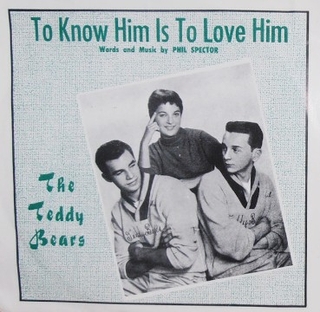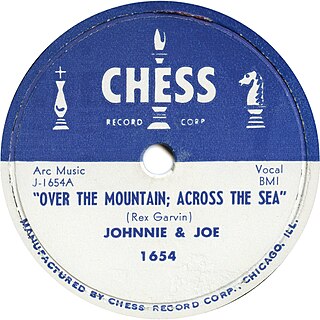Related Research Articles

Burt Freeman Bacharach was an American composer, songwriter, record producer, and pianist who is widely regarded as one of the most important and influential figures of 20th-century popular music. Starting in the 1950s, he composed hundreds of pop songs, many in collaboration with lyricist Hal David. Bacharach's music is characterized by unusual chord progressions and time signature changes, influenced by his background in jazz, and uncommon selections of instruments for small orchestras. He arranged, conducted, and produced much of his recorded output.

"Take Good Care of My Baby" is a song written by Carole King and Gerry Goffin. The song was made famous by Bobby Vee, when it was released in 1961.
"Blue Velvet" is a popular song written and composed in 1950 by Bernie Wayne and Lee Morris. A top 20 hit for Tony Bennett in its original 1951 version, the song has since been re-recorded many times, with a 1963 version by Bobby Vinton reaching No. 1.

Blue on Blue is Bobby Vinton's sixth studio album, released in 1963. Cover versions include the jazz songs "St. Louis Blues" and "Blueberry Hill", "Am I Blue", "Blue, Blue Day", the Fleetwoods' hit "Mr. Blue", "My Blue Heaven", three show tunes, and The Clovers Rhythm and blues hit, "Blue Velvet".

"To Know Him Is to Love Him" is a song written by Phil Spector, inspired by words on his father's tombstone, "To Know Him Was to Love Him." It was first recorded by the only vocal group of which he was a member, the Teddy Bears. Their recording spent three weeks at No. 1 on the Billboard Hot 100 chart in 1958, while reaching No. 2 on the UK's New Musical Express chart. Peter & Gordon and Bobby Vinton later had hits with the song, with its title and lyrics changed to "To Know You Is to Love You". In 1987, the song was resurrected by Dolly Parton, Linda Ronstadt, and Emmylou Harris, whose Trio recording topped the U.S. country singles chart. The song is in 12/8 time.

"Mr. Lonely" is a song co-written and recorded by American singer Bobby Vinton, backed by Robert Mersey and his Orchestra. The song was first released on Vinton's 1962 album, Roses Are Red.

Heart of Hearts is Bobby Vinton's twenty-sixth studio album and his second studio album for ABC Records. It was released in 1975. "Beer Barrel Polka" is the album's most successful single, peaking at # 5 on the Adult Contemporary Chart. A second single was "Wooden Heart" a #23 Adult Contemporary hit with partial Polish lyrics. Other notable tracks include Morris Albert's hit "Feelings" and Vinton's own composition "Adios Amigo" which was a big country hit for Marty Robbins.

Blue Velvet was the soundtrack of the film of the same name. It included original music by composer and conductor, Angelo Badalamenti. It was released in 1986 on Varèse Sarabande.

The discography of American singer-songwriter Bobby Vinton consists of 38 studio albums, 67 compilation albums, two video albums, three live albums, and 88 singles.

"Roses Are Red (My Love)" is a popular song composed by Al Byron and Paul Evans. It was recorded by Bobby Vinton, backed by Robert Mersey and his Orchestra, in New York City in February 1962, and released in April 1962, and the song was his first hit.
"There! I've Said It Again" is a popular song written and published by Redd Evans and David Mann in 1941. In early 1945, Vaughn Monroe and his Orchestra released Victor 20-1637, which reached the number one position on the Billboard's National Radio Airplay chart for five straight weeks, then no.2 for six more weeks, and a total run of 29 weeks. It finished 1945 as the no. 4 record of the year.

"Only Love Can Break a Heart" is a popular song from 1962, performed by the American singer-songwriter Gene Pitney. The song was written by Hal David (words) and Burt Bacharach (music) and appears on Pitney's second album Only Love Can Break a Heart.
"Lonely Street" is a 1956 song written by Carl Belew, Kenny Sowder, and W.S. Stevenson, originally performed by Belew, and later by Dave Rich. Its most successful rendition was by Andy Williams, whose version reached #5 on the Billboard chart and #20 on the R&B chart in 1959. The song appeared on his 1959 album, Lonely Street. Archie Bleyer's Orchestra played on the song.
"Please Love Me Forever" is a song written by John Malone and Ollie Blanchard. The song was originally released by Tommy Edwards in 1958. Hit versions were later released by Cathy Jean and the Roommates in 1960 and Bobby Vinton in 1967.
"Just as Much as Ever" is a song written by Charles Singleton and Larry Coleman. The song was a hit single for Bob Beckham, Nat King Cole, and Bobby Vinton.
"Clinging Vine" is a song released by Bobby Vinton in 1964. The song spent 8 weeks on the Billboard Hot 100 chart, peaking at No. 17, while reaching No. 2 on Billboard's Pop-Standards Singles chart, No. 14 on the Cash Box Top 100, No. 11 on Canada's RPM "Top 40-5s", and No. 9 on Canada's CHUM Hit Parade.
"My Heart Belongs to Only You" is a song written by Frank Daniels & Dorothy Daniels. Bette McLaurin and June Christy both released versions of the song in 1952. In 1953, the song reached No. 27 on Cash Box's chart of "The Nation's Top 50 Best Selling Records", in a tandem ranking of June Christy, Bette McLaurin, these versions were marked as bestsellers.

"Rain Rain Go Away" is a song released by Bobby Vinton in August 1962.
"Coming Home Soldier" is a song co-written and sung by Bobby Vinton, which he released in 1966. The song is a sequel to Vinton's previous hit "Mr. Lonely," sung from the perspective of a man who is returning home to the girl he loves, after having fought in a war overseas, and has survived without serious injury. The song spent 12 weeks on the Billboard Hot 100 chart, peaking at No. 11, while reaching No. 29 on Canada's CHUM Hit Parade, and No. 89 on Canada's RPM 100.

"Over the Mountain; Across the Sea" is a song written by Rex Garvin. The song was a hit for Johnnie & Joe in 1957 and Bobby Vinton in 1963.
References
- ↑ "Bobby Vinton's All-Time Greatest Hits," Varese (Vintage) Sarabande CD compilation, copyright 2003
- ↑ "Bobby Vinton's All-Time Greatest Hits," Varese (Vintage) Sarabande CD compilation, copyright 2003
- ↑ "Bobby Vinton's All-Time Greatest Hits," Varese (Vintage) Sarabande CD compilation, copyright 2003
- 1 2 3 4 Dominic, Serene (2003). Burt Bacharach: Song by Song. New York: Schirmer. pp. 104–5. ISBN 0-8256-7280-5 . Retrieved September 26, 2012.
- ↑ Lonergan, David (2005). Hit Records, 1950-1975. Lanham, MD: Scarecrow Press. p. 22. ISBN 0-8108-5129-6 . Retrieved September 26, 2012.
- 1 2 Bobby Vinton - Chart History - The Hot 100 Archived 2016-01-16 at the Wayback Machine , Billboard.com. Accessed October 23, 2015
- ↑ Bobby Vinton - Chart History - Adult Contemporary Archived 2016-01-16 at the Wayback Machine , Billboard.com. Accessed October 23, 2015
- 1 2 "Middle-Road Singles", Billboard , July 6, 1963. p. 36. Accessed October 23, 2015
- ↑ "Top Records of 1963", Billboard , Section II, December 28, 1963. p. 30. Retrieved February 17, 2018.
- ↑ Bronson, Fred (2003). The Billboard Book of Number 1 Hits (5th ed.). New York: Billboard Books. p. 146. ISBN 0-8230-7677-6 . Retrieved September 26, 2012.
- ↑ "Hits of the World", Billboard , October 5, 1963. p. 22. Accessed October 23, 2015
- ↑ "CHUM Hit Parade", CHUM, Week of June 17, 1963
- ↑ "Lever Hit Parade" 18-Jul-1963, Flavour of New Zealand. Accessed October 23, 2015
- ↑ "Hits of the World", Billboard , August 17, 1963. p. 35. Accessed October 23, 2015
- ↑ "Hits of the World", Billboard , October 19, 1963. p. 34. Accessed October 23, 2015